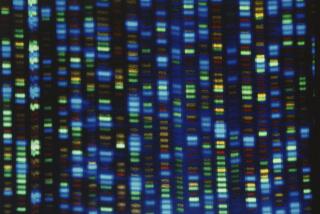Quest for the Perfect Human Has Severe Flaws
“Efforts to improve the inherited genome of persons might . . . foster attempts to have perfect children by correcting their genomes.” --American Assn. for the Advancement of Science report, September 2000
“Original sin is conveyed from our parents unto their posterity by natural generation, so as all that proceed from them are conceived and born in sin.” --Westminster Larger Catechism, 1649
Are human beings perfectible? On this question, at least, the Calvinists may have come closer to the truth than more contemporary observers. With all due respect to molecular genetics as the secular religion of the day, human beings are no more perfectible through genetics than through moral teaching. It is a fallacy to believe that manipulation of genes can ever create “perfect” healthy human beings.
Like most fallacies, this one rests on a shred of truth. Genes do cause illness. Sickle cell anemia and cystic fibrosis are genetic diseases. Even such “environmental” diseases as lung cancer have genetic components. Genes probably play some role, great or small, in every disease known to humankind.
So why not fix these genes? If we had the technology, why not snip these troublesome genes from the whole human genome? The reason is that, with few exceptions, the genes are not broken. Unless the genes are a recent mutation, they probably exist for a reason. To “fix” them may be to invite trouble elsewhere.
Consider sickle cell anemia. No one would wish this affliction on their children. However, the very parents whose children are at risk of sickle cell are themselves resistant to malaria. Protection from malaria may seem like an unnecessary insurance policy to most Americans. But if the sickle cell gene did not exist, humankind would be the worse for it. Malaria is a dangerous disease for which there is no immunization or vaccination. It kills a million people a year. And its threat is not as remote as we might think--with continued global warming, the mosquito that carries malaria is expected to spread to the United States.
How about cystic fibrosis? The genetic variant we fear as the “cystic fibrosis gene” has another job. Its carriers are apparently resistant to typhoid fever, caused by salmonella. Typhoid fever may be unfamiliar to most Americans, but it infects millions of people around the world, and it kills about 600,000 a year. As salmonella becomes increasingly resistant to antibiotics, the death toll is predicted to rise.
Then there is the flood of discoveries of gene variants that lead to breast cancer, diabetes, asthma and Alzheimer’s disease. Are these genes simply bad players, “mutations” that need to be deleted from the human gene pool? Or could some of these “disease genes” provide benefits we haven’t figured out yet? This is not to argue that people should be unconcerned about genetic risks. The point is that what makes a gene “good” or “bad” may depend on the circumstance as much as the gene.
As the tools of molecular genetics are increasingly brought into clinical research, there will be better understanding of these complex gene actions. With better understanding, we may be able to control the progression of certain diseases. Perhaps we will even be able to intervene early enough to prevent the disease. But prevention does not have to come at the cost of changing the human genome. Indeed, it should not.
Let’s come back to the idea of the perfectible human. As a species, humans are not a final product, with just a few blemishes here and there to be touched up. We are a work in progress. Gene mutation and natural selection are creative processes that, however slowly, continue to shape us.
Under any given set of circumstances, some gene variants are an advantage and others a disadvantage. But circumstances change. Our climate is warming. Species become extinct, and the ecology of our planet shifts. Dangerous new infectious diseases arise. HIV is a conspicuous example but certainly not the last. We err gravely if we assume our air-conditioned, bottled-water world is the permanent environment of our progeny. Future generations may all wish they were sickle cell carriers. Attempts to achieve genetically “perfect” humans under the conditions of contemporary America would not merely be foolish. It would be reckless.
In the final analysis, the message is not without hope. The countless variations within our gene pool are a remarkable insurance package. They increase the chances that we, as a species, can cope with what lies ahead. Our genetic “imperfections”--or better put, our genetic diversity--are a hedge against the unknowable circumstances that await our children, and their children, and all who follow. Hearkening back to those Calvinists, who instructed us to “hate the sin but love the sinner,” we should hate the disease but love the gene.






